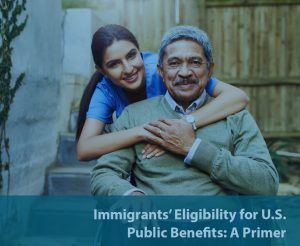US benefits system a minefield for migrants, refugees – report
 Lack of access to public benefits programs is having a significant negative effect on the health and wellbeing of migrant and refugee families in US, a new report claims.
Lack of access to public benefits programs is having a significant negative effect on the health and wellbeing of migrant and refugee families in US, a new report claims.
And policy decisions made over decades have left “a confusing patchwork of eligibility policies” that mean many groups of newly arrived people are eligible for some benefits but not others, while others are excluded completely.
The report, titled ‘Immigrants’ Eligibility for US Public Benefits: A Primer’, produced by the Migration Policy Institute, says: “Many federal programs and services provide important support to individuals and families in need”.
“These public benefits have various, usually complex, eligibility requirements. For immigrants, additional eligibility criteria come into play, particularly those stemming from the 1996 federal law that restricts many noncitizens’ eligibility to most federal public benefits programs.
“Restricted access to public benefits and other sources of support have a proven, strong effect on the health and well-being of immigrant families, including many with U.S.-citizen children,” the report says.
It says one of the most damaging policy setting is the a 1996 law which introduced a five-year waiting period before immigrants granted permanent residence to be eligible for benefits, with some exceptions.
“In some cases, particularly for entitlement programs such as Social Security and Medicare, legal non-citizens may be theoretically eligible for benefits, but requirements related to length and type of US work history make it difficult for many to participate,” the report said.
“In other cases, access to programs – such as the Earned Income Tax Credit (EITC) and REAL ID compliant driver’s licenses – is related not to immigration status, per se, or length of US residence, but access to work authorization and valid Social Security numbers,” the report says.
“Immigration status also shapes noncitizens’ access to work authorization, an important factor in the ability of many to find stable employment and earn a family-sustaining wage.
But it says that some states offer support to non-citizens while others do not.
“Finally, while federal law restricts access to federally funded programs and services for many noncitizens… (there are) examples of how states and localities may offer alternative forms of support,” the report says.
“In the cases of California and Illinois, state authorities have expanded the access that noncitizens (sometimes including unauthorized immigrants) have to certain programs and services, thereby reducing the hardships that flow from the complexity of federal law, which can represent a barrier even for non-citizens who are eligible for key benefits.”
The report says that during the COVID-19 pandemic, access to public benefits were expanded but been taken away from millions of people since the end of the emergency.
“The end of the public health emergency, announced on May 11, 2023, signalled a return to standard eligibility rules. This return has brought a significant loss of access to support for low-income individuals and families,” the report says.
“For example, states now need to re-verify the eligibility of everyone enrolled in Medicaid. At the onset of this ‘unwinding’ process, analysts projected that the Medicaid unwinding could lead to the disenrollment of 15 million people, with nearly half losing coverage due to administrative barriers, despite still being eligible for the program.
“Noncitizens, especially those with limited English proficiency, were expected to experience particular challenges to maintaining Medicaid coverage. As of November 2023, at least 2 million low-income children had lost Medicaid coverage, in most cases solely due to administrative issues.
“Meanwhile, the expiration of pandemic-era benefits, even before the Medicaid unwinding, contributed to an overall rise in poverty between 2021 and 2022,” the report says.
Read the full report: Research: Immigrants’ Eligibility for U.S. Publi.. | migrationpolicy.org












